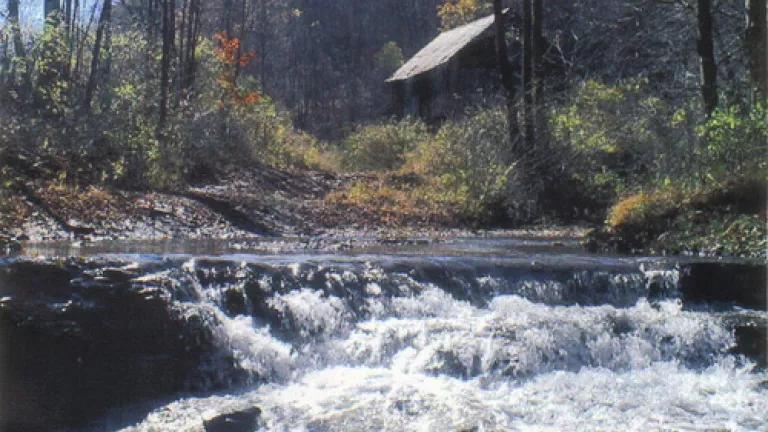
Last Sunday night, CBS’s 60 Minutes aired a report on natural gas production in America, including concerns about the environmental impacts. Interviewed on the program was Aubrey McClendon, the CEO of Chesapeake Energy, one of the country’s largest producers of natural gas and widely considered a leader in the field.
Yet recent – and as of yet unreported – findings by the U.S. Environmental Protection Agency (EPA) reveal that Chesapeake is also a company that violated the Clean Water Act four times in one county in West Virginia. In October and November 2010, EPA initiated four Clean Water Act enforcement actions against Chesapeake Energy. Through field investigations, EPA documented illegal discharges of dredge and fill material at several Chesapeake drilling sites in Wetzel County. It appears that the company built access roads for giant trucks directly through a stream without the permits required under section 404 of the Clean Water Act. We thank EPA for investigating activities in this remote corner of Appalachia.
What does this look like in real life? Here is a "before" photo of this stream, which used to have a lovely little waterfall that local citizens tell me was prized by the community (so much so that they photographed it):

Photo credit: (c) Ed Wade, Jr., used with permission
Chesapeake could have built bridges over these streams and worked with the U.S. Army Corps of Engineers to develop approved projects. Instead, it appears the company opted to cut corners and operate in flagrant disregard of one of our nation’s cornerstone environmental laws--the Clean Water Act.
I visited this area—Wetzel County, West Virginia–and saw stream destruction myself in August. I was disturbed to hear reports of additional environmental damage happening there.
- Families told me that they have contaminated drinking water. They say they noticed changes in their water after Chesapeake began hydraulic fracturing of nearby natural gas wells. Families report that they experienced rashes, mouth sores, and stomach ailments after they drank their water. They also report they observed health symptoms and even death in their goats, lambs and chickens. Their water tests detected dangerous substances in their drinking water including benzene, toluene, acetone, acrylonitrile and styrene. These families told me that they asked the state for assistance but state agencies responsible for environmental protection refused to test their water.
- There's more--they told me about very noxious air pollution that makes them ill.
- In addition, they said that gas industry workers had spread coal cinders on their roads in the wintertime to improve traction on the ice. But coal cinders, which are a waste product from coal-fired power plants, can run off into streams when the ice melts. And, as a form of coal waste, they could be toxic and contain arsenic, mercury, or other dangerous substances.
According to many defenders of the natural gas industry, states are doing a fully proficient job of regulating natural gas exploration and production. In state after state, however, we have seen this is not the case. In many cases, regulations are sorely outdated and/or policies are not fully enforced, due to woefully inadequate inspections and enforcement.
Communities need stronger regulations, better enforcement, meaningful penalties, and new state and federal laws to fully protect human health and the environment from the dangerous contamination that can be caused by oil and gas production. Some penalties have not been updated in decades! But it’s not all government’s responsibility.
Companies should obey the law, be held accountable when they break it, and adopt a zero tolerance policy for violating the law. By continuing to hide information on chemicals and practices, and opposing new regulations, industry only increases mistrust and acrimony by communities.
Some places are so sensitive they must be completely off-limits to oil or gas drilling. But where drilling does occur, we know cleaner approaches are available to industry and are economical – in some cases it is as low-tech as building a bridge. The industry would benefit, as would we all, by working with environmental organizations and regulators to come up with a meaningful set of the best technologies and safeguards that are uniformly adopted and in which the public can have confidence.
Thanks to Craig Michaels at Riverkeeper for help with this blog post.
